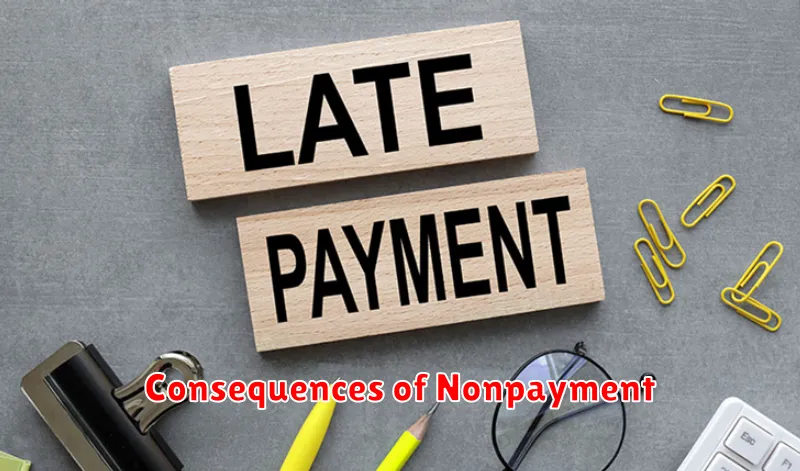Facing the daunting prospect of debt? Understanding what happens if you stop paying your debts is crucial to navigating this challenging financial situation. This article explores the serious consequences of debt default, outlining the potential impact on your credit score, bank accounts, and overall financial well-being. We’ll examine the various legal actions creditors can take, from wage garnishment to lawsuits, and provide insights into strategies for managing your unpaid debts. Learning about your options is the first step towards regaining control of your finances.
Ignoring your financial obligations can lead to a cascade of negative events that significantly impact your life. From the immediate consequences like late fees and account closures to the long-term repercussions such as difficulty obtaining loans, renting a property, or even securing employment, the ramifications of debt default are far-reaching. This comprehensive guide aims to shed light on the potential legal and financial ramifications of failing to repay your debts, empowering you to make informed decisions and navigate this complex situation effectively. This article is essential reading for anyone struggling with unmanageable debt.
Consequences of Nonpayment

Failing to make debt payments can trigger a cascade of negative consequences, significantly impacting your financial well-being and creditworthiness. The severity of these consequences varies depending on the type of debt and the creditor involved.
One of the most immediate consequences is the accrual of late fees. These fees can quickly add up, increasing the overall amount you owe. Beyond late fees, many creditors will report your missed payments to the major credit bureaus, resulting in a significant drop in your credit score. A lower credit score can make it harder to secure loans, rent an apartment, or even get a job in some cases.
Collection efforts intensify as missed payments accumulate. Creditors may repeatedly contact you by phone, mail, or email, demanding payment. They may also engage third-party collection agencies, which can be even more aggressive in their pursuit of payment. These actions can be stressful and disruptive to your daily life.
For secured debts, such as mortgages or auto loans, nonpayment can lead to even more serious repercussions. Creditors can initiate foreclosure proceedings on your home or repossess your vehicle. This can result in the loss of your property and a significant financial setback.
In some cases, depending on the debt and jurisdiction, legal action may be pursued. This can include lawsuits and wage garnishment, where a portion of your paycheck is seized to satisfy the debt. Legal action can result in significant financial hardship and damage to your credit history.
The impact of nonpayment extends beyond the immediate financial consequences. It can severely damage your creditworthiness, making it difficult to obtain future credit, purchase a home, or secure favorable interest rates on loans for many years to come. The long-term implications of failing to repay debts should not be underestimated.
Collection Agencies and Lawsuits
Failing to make payments on your debts can lead to involvement with collection agencies. These agencies are hired by creditors to recover outstanding balances. They will contact you through various means, including phone calls, letters, and emails, demanding payment.
Collection agencies are known for their aggressive tactics. They may attempt to negotiate a settlement, but they also have the power to pursue legal action to recover the debt. The specific methods they employ vary, depending on the debt and applicable laws.
A common outcome of ignoring a collection agency is a lawsuit. The creditor or collection agency can file a lawsuit against you in civil court to obtain a judgment. This judgment then allows them to legally pursue various actions to collect the debt, including wage garnishment, bank account levies, and property liens.
The legal process can be lengthy and complex. You will need to respond to the lawsuit within a specific timeframe or risk a default judgment, which significantly weakens your position and makes it harder to challenge the claim. Ignoring a lawsuit is not advisable.
Legal representation is strongly recommended if you are sued by a collection agency. An attorney can help you understand your rights, negotiate with the agency, and defend you in court. They can also help you explore options such as bankruptcy, if appropriate.
The consequences of a lawsuit can be severe, including damage to your credit score, wage garnishment, and even the seizure of assets. Understanding your rights and responsibilities during the legal process is critical in mitigating the negative impact of a debt-related lawsuit.
Impact on Credit Reports
Failing to make debt payments will have a significant and lasting impact on your credit report. This impact is primarily reflected in a lowered credit score.
When a payment is missed, the creditor reports this delinquency to the major credit bureaus (Equifax, Experian, and TransUnion). This negative information remains on your report for a considerable period, typically seven years for most debts, though some, like bankruptcies, can stay longer.
The severity of the impact depends on several factors, including the type of debt (credit cards, mortgages, student loans), the amount owed, and the number of missed payments. A single missed payment might cause a minor dip, while consistent late payments or defaults can severely damage your credit score.
Collection agencies may also become involved if payments remain outstanding. Their actions are also recorded on your credit report, further negatively impacting your creditworthiness.
A significantly lowered credit score can make it harder to obtain future credit, such as loans or credit cards, and can lead to higher interest rates on any credit you are able to secure. This increased cost of borrowing can have a long-term financial impact.
It is crucial to understand the potential consequences of neglecting debt payments and to address any financial difficulties proactively. Contacting creditors to explore options like repayment plans or debt consolidation can help mitigate the negative consequences on your credit report.
How to Start Negotiating Repayment
If you’ve fallen behind on your debt payments, negotiating a repayment plan with your creditors is crucial to avoid further damage to your credit score and potential legal action. The first step is to contact your creditors directly. Don’t ignore collection notices; proactive communication demonstrates your willingness to resolve the situation.
When contacting your creditors, be prepared to explain your financial circumstances honestly. Provide a clear picture of your income, expenses, and assets. This transparency is key to building trust and demonstrating your commitment to repayment. Be polite and professional throughout the conversation, even if you feel frustrated or overwhelmed.
Explore different repayment options. You may be able to negotiate a lower monthly payment, an extended repayment period, or a settlement for a lump sum less than the total debt owed. Be realistic in your proposals, considering what you can realistically afford. Creditors are often more willing to work with borrowers who demonstrate a genuine effort to repay.
Get everything in writing. Once you’ve reached an agreement, ensure it’s documented in writing and signed by both parties. This written agreement will protect you and provide a clear record of the agreed-upon terms. Carefully review the document before signing to ensure you understand all the conditions.
Consider seeking professional help. If you’re struggling to manage multiple debts or negotiate with creditors effectively, consulting a credit counselor or debt management agency can be beneficial. These professionals can provide guidance and support throughout the process, helping you navigate complex financial situations.
Bankruptcy as a Last Resort
Facing overwhelming debt can feel incredibly stressful and isolating. While ignoring your financial obligations might seem like a temporary solution, it ultimately leads to serious consequences. Ignoring debt will not make it disappear; instead, it will likely worsen the situation exponentially. Creditors will pursue various methods to collect payment, including phone calls, letters, and ultimately, legal action.
When all other options have been exhausted, and the weight of debt is truly insurmountable, bankruptcy may be considered as a last resort. It is a complex legal process that requires careful consideration and professional guidance. It’s crucial to understand that filing for bankruptcy should only be undertaken after exploring all other possible avenues for debt resolution, such as debt consolidation, debt management plans, or negotiating with creditors.
Bankruptcy involves legal proceedings where a court oversees the distribution of your assets to pay off your debts. The type of bankruptcy declared (Chapter 7 or Chapter 13) depends on factors like income, assets, and the amount of debt owed. Chapter 7, often referred to as liquidation bankruptcy, involves selling non-exempt assets to pay off creditors. Chapter 13, on the other hand, is a reorganization bankruptcy, involving a repayment plan over a period of three to five years.
It is important to note that bankruptcy has significant long-term implications on your credit score and financial future. It remains on your credit report for a considerable period, impacting your ability to obtain loans, credit cards, or even rent an apartment in the future. Therefore, seeking professional advice from a bankruptcy attorney is paramount to understanding the process and its consequences before making such a significant decision.
Choosing bankruptcy is a serious step with potentially lasting consequences. Before considering this option, thoroughly explore all alternatives and consult with financial experts and legal professionals to determine the best course of action based on your specific financial circumstances.
Where to Get Legal Help
Facing legal challenges related to unpaid debt can be overwhelming. Knowing where to turn for assistance is crucial. Several resources can provide the legal guidance you need.
Legal aid organizations offer free or low-cost legal services to individuals who meet specific income requirements. These organizations often specialize in debt-related issues, including bankruptcy and debt collection practices. They can provide valuable advice and representation.
Non-profit credit counseling agencies may not provide direct legal representation, but they can offer valuable guidance on debt management strategies and connect you with appropriate legal resources. They can help you navigate the complexities of debt and potentially avoid legal complications.
Law school clinics affiliated with many universities offer legal services at a reduced cost or pro bono (free). These clinics often have students working under the supervision of experienced attorneys, providing a valuable learning opportunity and affordable legal assistance.
Finally, consulting with a private attorney specializing in bankruptcy or debt collection is an option, although it typically comes with higher costs. A private attorney can offer personalized attention and aggressive representation in your specific circumstances. Remember to inquire about their fees and payment plans before engaging their services.

